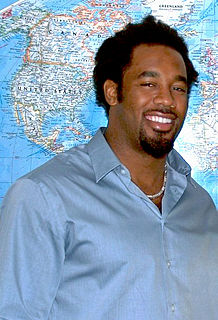A Quote by Jerry A. Coyne
There is no horror, no amount of evil in the world, that a true believer can't rationalize as consistent with a loving God. It's the ultimate way of fooling yourself.
Related Quotes
My study of Gandhi convinced me that true pacifism is not nonresistance to evil, but nonviolent resistance to evil. Between the two positions, there is a world of difference. Gandhi resisted evil with as much vigor and power as the violent resister, but True pacifism is not unrealistic submission to evil power. It is rather a courageous confrontation of evil by the power of love. . . .
There's two kinds of evil that horror fiction always deals with. One kind is the sort of evil that comes from inside people, like in Dr. Jekyll and Mr. Hyde. The other kind of evil is predestined evil. It falls on you like a stroke of lightning. That's the scary stuff, but, in a way, it's the stuff you don't have to worry about. I gotta worry whether or not I'm getting cavities. I gotta worry about whether cigarettes are giving me cancer. Those are things I can change. Don't give me lightning out of a clear sky. If that hits me I just say, "That's probably the way God meant it to be."
Evil is thus a kind of parasite on goodness. If there were no good by which to measure things, evil could not exist. Men sometimes forget this, and say, there is so much evil in the world that there cannot be a God. They are forgetting that, if there were no God, they would have no way of distinguishing evil from goodness. The very concept of evil admits and recognizes a Standard, a Whole, a Rule, an Order. Nobody would say that his automobile was out of order if he did not have a conception of how an automobile ought to run.
When you're playing the devil, you're playing the ultimate evil. There are no boundaries. In doing a film in the horror genre or a psychological thriller, you're really pushed as an actress, you're pushed way outside of your comfort zone. Emotionally, mentally, and physically. That's when things really get fun.
You have to say, whatever it is that I say or do or think or teach must be something that will be consistent with who Jesus Christ was. So that is your ultimate litmus test, not that you've got specific words to say, whatever they may be saying. It is what is being said. They're consistent with the revelation of God that we encounter in Jesus.
The act of self-denial seems to confer on us the right to be harsh and merciless toward others. The impression somehow prevails that the true believer, particularly the religious individual, is a humble person. The truth is that the surrendering and humbling of the self breed pride and arrogance. The true believer is apt to see himself as one of the chosen, the salt of the earth, a prince disguised in meekness, who is destined to inherit this earth and the kingdom of heaven, too. He who is not of his faith is evil; he who will not listen shall perish.



































